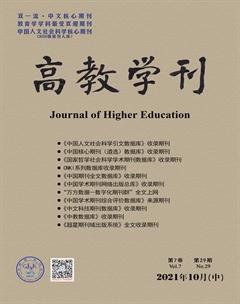人工智能背景下思想政治教育的風險機理和防范對策探究
孫智妍

摘 ?要:人工智能技術能夠顯著提升育人的針對性與時效性,在當前思想政治教育工作中發揮著舉足輕重的作用。然而,從信息傳遞的角度來看,機械地引入人工智能技術必然為思想政治教育帶來新的風險與挑戰——思想政治教育信息安全。文章從信息傳遞角度出發,識別風險來源、揭示風險本質,進一步厘清人工智能下的思想政治教育所面臨的現實問題,并建議采用與人工智能相兼容的保密通信技術規避風險。在此基礎上針對人工智能背景下的思想政治教育風險防范提出對策,即增強“四個意識”、堅決做到“兩個維護”,做到重視人的意識形態工作、加強青年學生的網絡信息安全教育和構建信息安全技術體系三方面的協同。
關鍵詞:人工智能;思想政治教育;信息安全;風險機理;防范對策
中圖分類號:G640 ? ? ? 文獻標志碼:A ? ? ? ? ?文章編號:2096-000X(2021)29-0053-04
Abstract: Artificial intelligence technology can significantly improve the pertinence and timeliness of education. AI technology plays an important role in the current ideological and political education. However, from the perspective of information transmission, the mechanical introduction of artificial intelligence technology will inevitably bring new risks and challenges: ideological and political education information security. From the perspective of information transmission, this paper identifies the source of risk, reveals the nature of risk, further clarifies the practical problems faced by ideological and political education under artificial intelligence, and proposes to adopt the secret communication technology compatible with artificial intelligence to avoid risks. On this basis, this paper puts forward countermeasures against the risk of ideological and political education under the background of artificial intelligence, that is, to strengthen the "Four Consciousness", firmly achieve the "Two Maintenance", pay attention to people's ideological work, strengthen the network information security education of young students and build the information security technology system.
Keywords: Artificial Intelligence; ideological and political education; information security; risk mechanism; preventive measures
高速發展的人工智能技術,不僅為網絡思想政治教育帶來了便利,并且為新時代網絡思想政治教育帶來了全新的變革與挑戰。《新一代人工智能發展規劃》中提出要“圍繞教育、醫療、養老等迫切民生需求,加快人工智能創新應用,為公眾提供個性化、多元化、高品質服務”[1]。高效可靠的網絡通信技術為網絡思政帶來了時效性,而人工智能技術擁有強大的數據分類、計算和決策能力,這些都為網絡思想政治教育的開展提供了空前的便利條件。然而,網絡通信技術本身長期存在著信息安全風險問題,思想政治教育信息在存儲、轉發與傳遞的過程中面臨著被竊取、攻擊甚至篡改破壞的風險;建立在通信網上的人工智能技術同樣面臨著信息安全問題,被攻擊的數據、被篡改的算法將對人工智能的決策過程造成極大的破壞。因此,對新時代下網絡思政教育面臨的風險進行探究與識別就顯得尤為重要。
一、思想政治教育的發展變革
思想政治教育經歷了從互聯網時代、大數據時代和人工智能時代的變革。以高開放度、強互動性為特點的互聯網時代快速發展,使思想政治教育在網絡上延伸成為可能,互聯網為思想政治教育的互聯互通提供了載體。隨著互聯網和通信技術的不斷發展,海量繁雜的數據充斥著人們的生活和工作,將這些大量的數據信息進行有效地挖掘和分析,已經在思想政治教育中得到一定程度的運用。在高校中,學生使用網絡平臺進行交流所產生的文字、圖片、視頻等資料構成了大量的數據信息,如果它們能夠被有效利用和研究,會產生出更有價值、有質量的信息和有規律性的結論,這將有助于實現學生管理科學化、學生服務精準化、思想政治理論課程教學個性化。
在移動互聯網、大數據、超級計算、傳感網、腦科學等新理論新技術以及經濟社會發展強烈需求的共同驅動下,人工智能加速發展,呈現出深度學習、跨界融合、人機協同、群智開放、自主操控等新特征[1]。2017年國務院正式發布的《新一代人工智能發展規劃》推動了新一代人工智能相關學科的發展,成為經濟社會各領域向智能化加速躍升的新引擎。

